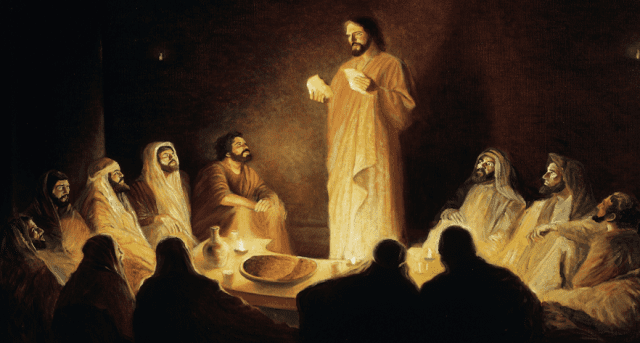
Love one another
After Judas left at the Last Supper, Jesus said to His disciples: “I give you a new commandment: love one another. As I have loved you, so you also should love one another. This is how all will know that you are my disciples, if you have love for one another.” (John 13:34-35)
What does this commandment mean and what are the implications of this bible verse? In the Pentateuch, only God gave commandments; therefore, giving a new commandment such as this one puts Jesus on par with Yahweh. Once again in a subtle way, Jesus reveals His divinity. There is a somewhat similar commandment in Leviticus: “You shall not hate any of your kindred in your heart. Reprove your neighbor openly so that you do not incur sin because of that person. Take no revenge and cherish no grudge against your own people. You shall love your neighbor as yourself. I am the LORD.” (Leviticus 19:17–18) These verses spell out the behavior with which Israelites should treat their fellow Israelites.
There is another passage in Leviticus which specifies the behavior of Israelites toward aliens: “When an alien resides with you in your land, do not mistreat such a one. You shall treat the alien who resides with you no differently than the natives born among you; you shall love the alien as yourself; for you too were once aliens in the land of Egypt. I, the LORD, am your God.” (Leviticus 19:33–34)
So, what is the difference between the commandments in Leviticus and the new commandment of Christ? One difference is that Jesus added the words “as I have loved you.” In the Person of Jesus Christ, God became man to teach us and show us how to love by His own example. Jesus didn’t just tell us, He showed us how to love in a self-sacrificing way for the good of another. In addition, Jesus taught us to love our enemies as well. (Matthew 5:43–48; Lk 6:27–36)
What is love? Love entails at least two important things: (1) to will in one’s heart the good of another, both neighbor and foe alike, and (2) to forgive from one’s heart, both friend and enemy alike. According to St. Thomas Aquinas, “To love is to will the good of another.” (CCC 1766)
Loving others has nothing to do with acting “nice.” One can act nicely to others while at the same time not willing what’s good for them, especially if there is a self-serving motive for being nice to someone.
Loving also has nothing to do with liking someone either. A person can like someone else for many reasons; e.g., the way that person looks or how rich that person is. But if he does not will the good of that person, then there is no love. There are many degrees of the good that can be willed for others, but the highest good that we can will for another is for that person to get to heaven.
Some people say to forgive is to forget, but forgetting an intense hurt or injury which one has to live with for the rest of one’s life is practically impossible. Besides, what is there to forgive if you have already forgotten? But to be able to forgive others despite a lingering hurt or memory is the sign of true forgiveness. It is not within our power not to feel or to forget an offense; but the heart that offers itself to the Holy Spirit turns injury into compassion and purifies the memory in transforming the hurt into intercession (CCC 2843). To forgive someone does not mean you are obliged to allow yourself to be abused. On the other hand, to forgive means not to seek revenge and to let go of any hatred or resentment towards others. To forgive means to be ready to help that person when it is a matter of life or death.
It is to our own benefit that we forgive others, even our enemies. If we can forgive others, then we bear witness that love is stronger than sin. But in addition, we free ourselves from the burden of anger, resentment and hatred. Forgiveness is the fundamental condition of the reconciliation of the children of God with their Father and of men with one another (CCC 2844). St. Paul reminds us that it is only when we have loved one another that we have truly fulfilled the commandments. (Rom 13:8-10)

Attention parents of kids from K to 8: we are planning 2 events in the summer for the children of our parish. June 11, Saturday we will have kid’s day out to the Atlanta Zoo. July 16, Saturday we will have Vacation Bible School. Please make every effort for your kids to participate in these events. Both events are free.

June 5, 2022 is Pentecost Sunday, there will be a Healing Prayer Service after the Vigil Mass (Chinese/English) on June 4. The Vigil Mass will be in Chinese and English. All are welcome!

Our church will be hosting the first Chinese Cursillo in Atlanta from July 28 to 31, 2022. The venue will be at the Carmel Retreat Center in Hoschton, which is only 40 minutes from the church.
Prayer List: Jiang Mama, Ma Yilan, Zheng Zhiming, Wang Dacheng, Carolyn Johnson, Pan Bohao, Long Guorui, Zhang Qiang, Xu Taicheng and Qiu Laihao.